|
"The
people who went to Iceland were the Vikings. And they went
because they couldn't deal with authority in Norway. So they flew
off into this mad ocean in a wooden boat which is pretty hardcore,
North Atlantic in the year 800. And found this island full of snow.
Yeaah!"
Björk
Guðmundsdóttir's ancestors, it seems, were a hairy bunch
of ocean-going anarchists intent on escaping the repression of the
Scandinavian mainland. They formed the world's first parliament,
gave unprecedented equality to their women, and got on with
creating a hard-working nation of proud individualists. And a
thousand years later, one of their fiercely independent, aggressively
optimistic, hard-drinking descendents came to England on a misson
to make a record.
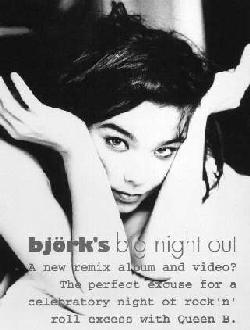
At her house, with the kitchen doors open on an overheated garden,
lubricated by sips of rusty red wine and accompanied by Debussy,
Björk delights in telling stories of Iceland. Each one casts a little
more light on her beloved island home and, by reflection, on this
snub-nosed, self-proclaimed "immigrant housewife". Iceland, as Björk
tells it, is still full of Vikings.
"The
United Nations did a survey, some years ago, to a sample
of people in all the countries in the world. They asked them 100
very basic questions. One was, 'what do you believe in?'. Everybody,
I mean 90 per cent of the universe, said 'Allah', or 'God' or
'The Virgin Mary', or 'Buddha', or whatever. In Iceland, they said
'myself'."
She stabs a thumbed fist towards her chest, conjuring up this
Icelandic everywoman: a loud, brutal character. Her globetrotting
accent takes a trip to a farm in Yorkshire for 'myself'. She grins
at the thought of her countryfolk and their happy arrogance.
"Another
question was 'are you happy?'. And people all over the
world were like 'no, not yet', or 'I used to be', or something. But
Iceland went, 'yes... of course... and fuck off'."
A part of Björk has been public property since she was 11, back when
she really was elfin and pixie-faced. Björk, an album of '70s pop,
brought her out of classical music school and onto the national
airwaves (although, as her mum points out, celebrity in Iceland is
a little unusual since "everybody knows each other already"). A
period of teenage punk rebellion in bands Tappi Tikarras ('Cork The
Bitch's Ass') and Kukl ('Sorcery'), led to the semi-serious jokery
of The Sugarcubes, which she left in 1992 with a head full of songs
too personal for their argumentative democracy. These musical pearls
rattled around her brain until she came to London, fiercely
determined to set them down in an album as perfect as she could make
it. This became Debut, and with its runaway success, London's gravity
increased and she now finds herself unable to leave.
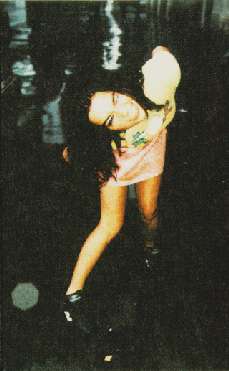
The book is now being closed on this saga with the release of a
video, Vessel, produced and directed by Stephane Sednaoui (who is
currently the object of the singer's undying affection). In the
captivating film, a B&W Björk tells the tale of how she was washed
up on these shores; shimmering in mirrors and rolling some overly
Icelandic 'Rs' around thoughts of cities, music, dreams and greasy
bags of chips. She takes the stage in footage of an elegant concert
she gave at London's Royalty Theatre, and there are even some shots
from behind the scenes at the Jean-Paul Gaultier show she catwalked
in Paris. The film is intended to document the unique live performances
which grew from Debut, and to put a seal on the album which
made her a Londoner.
In addition, plans are afoot for an MTV Unplugged spectacular,
in which Björk will sing with the World Saxophone Quartet and an
entire gamelan ensemble. And, as a gesture of thanks to the dance
world she so delicately entranced, there will be a low-key, non-commercial
(Björk insisted the record be priced so she makes no
money) release of a remix album, All The Remixes Of The Debut Album
For People Who Don't Buy White Labels, offering versions of certain
songs previously available only to DJs. The record includes Underworld's
reworking of Human Behaviour, Sabres Of Paradise's treatment
of Come To Me and One Day, and Black Dog's versions of The
Anchor Song and Come To Me.
She's coy on the subject of new material, though she insists
there are at least 20 songs she's ready to take into the studio;
several of which are the result of a weekend she spent in Cambridge
with renowned percussionist Evelyn Glennie ("at her percussion
amusement park").
I expect you've seen Björk's face before. Viewed in the light of
a West London kitchen, it's an enchanting reality; all the more
alluring because it's attached to a full-size person. You can play
a game, spotting whenever it twitches or stretches into one of her
cartoon poses and gives you the chance to make doll, elf or child
comparisons. Mercifully, it stays remarkably grown-up most of the
time - give or take a few urchin-like nose-scratchings.
"People
were very aware that I was only one copy of me, and I
was a bit of the odd-one-out sort of thing,"
she muses, "but I
think today if you asked my best friends to describe me they'd say
I was very down to earth. They wouldn't say all this weird, weirdo
shit."
She wears an acid-lime miniskirt under a matching T-shirt that
has a printed picture of the Moomins, Finland's favourite childrens'
characters. "They're totally Tao," she enthuses, recounting how
she got into the books while reading them to her eight-year-old son,
Sindri. "And like, really optimistic.
It's written by this crazy Finnish lady who lives on an island."
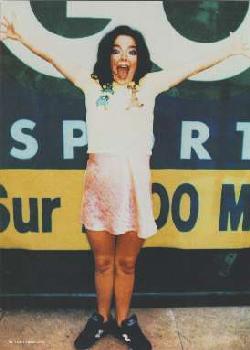
A night with Björk goes like this. We whisk in and out of a
Galliano concert (where she proves the piercing power of her voice
talking to me over the band about Madness and cider), then head
to a party where her chum Howie B is DJing soulful hip hop sounds.
While we're tapping our toes at the bar, with Björk offering the
occasional ragga-girl grind, her friends arrive. Three loud,
beautiful girls.
Björk sees them and they offer small clues that they know each
other: uncontrollable screaming, broad face-to-face grins, and maniac
jump-up hugging. Then there are slammers. Many. Let the drinking
begin. The four girls act like they've been re-united after a
kidnapping. "When I
get drunk I'm usually over-the-top happy, just
on a mission," admits Björk.
"It's like all or nothing. You can
stay at home and be sober, or get completely drunk. I wish I could
be all polite and sit and drink two bottles of red wine and make
it last for nine hours, but unh-uh. It has to be fucking blitzkrieg."
After the third round of tequila slammers (the ones with
champagne), I stop feeling like it's a
blind date and I'm on my best behaviour. Björk begins teaching the
befuddled bartender how to mix B-52s. But the drinks are failures:
instead of sitting delicately on top of each other, the liquids
mix into a murky gloop. Perhaps the spoon was too big. Anyhow, it
doesn't stop us downing them in a gleeful gulp of chocolatey alcohol.
"Björk," my friend Matt tells her, "you're fierce."
The evening winds down into a late night booze-energy hangout,
with the girls quizzing us about love and eternity. Girlfriend
and boyfriend troubles slide around the bar along with the drink,
and Björk, with her Hägar The Horrible drinking head on, apologises
for the depressingly sterile atmosphere of the place. "Britain's
crap for drinking." We head down to the empty dancelloor, and she
makes a vain attempt to wrest control from the dinner-jacketed DJ.
Back to the bar, there's more inebriate behaviour, and the evening
drifts off into a pool of double vision.
However hard you freak out in Iceland, there isn't far to fall.
It's a small secure place; a rounded, moss-covered island. Growing
up there, Björk learnt to trust in impulsive, extreme, dangerous
freedom. The first things she bought were a tent and a sleeping bag.
Part of her life was lived in an uptight bureaucratic family, another
part was in her mother's hippie collective. She sampled the rewards
of each, delighting in dropping cultural bombs from one to the other.
"Going
to my conservative family and being the really freaky hippie,
with the long hair and barefoot, and I go back to my hippie people
and say, 'listen, actually you're supposed to sleep once a day, you're
supposed to eat bread', and being really down-to-earth practical,
conservative, being the little kid to say, 'listen, I want food now,
mum! Dinner, no, stop it, comb your hair, now', sort of thing."
This bratty irreverence is what inspires her musical voracity.
She ignores categories, simply deciding what's great and what isn't.
"I like
the pure things, the really extreme things. I don't like the
stuff in the middle." Maria Callas, Igor Stravinsky, Public Enemy and
The Swans all get her vote, as does anything which upsets complacency.
"I'd go to my classical school and say, 'you want to hear the new Jimi
Hendrix album, it's grrreat!'"
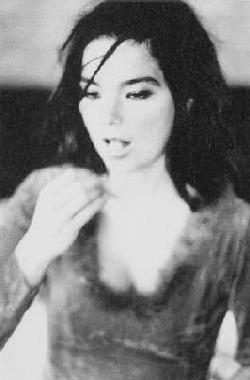
Her latest musical passion is jungle. She tells me she adopts an
anthropological approach and sneaks along to raves in
"David Attenborough mode".
Her face lights up as she describes her attraction.
"It's positive.
It's about fierce, fierce, fierce joy. That sort of
[she pants like a dog, imagining dance exhaustion]
I'm just too happy,
I want to explode. Aaarrgghh! That's jungle. It's like when you meet
a person who you know is going to be your friend for ten years. And
the energy that's there, it's like aargghh!"
Björk classifies music in terms of its energy, its feeling. But
it's only recently that she realised language could contain similar
power. "I never used to believe in
words," she shrugs, "and at first
I didn't sing in words, it was just noises and sounds. I used to be
in an experimental band with my best friend when I was 15. She played
the popcorn machine and miked it up, and I played the drums to it.
We weren't even trying to be funny. And my friend organised to record
my grandfather snoring, and that was supposed to be our loop, our
rhythm [she snores theatrically] to do a song to."
However, singing for an audience brought out a need for greater
communication than her love of pure sounds could offer.
"You're just
about to explode because you've got so many things to express. But
if you just say 'happiness' in English it will get people half the
way."
And now, she says, she is completely passionate about poetry.
"A lot
of times it's the only thing that can sort my head. It's one
of the vital parts of my life now. As sleeping or eating or fucking
or music."a
There's a small silence. "I
feel always naked after a sentence like that," she says
"I've talked so much about my
fucking life in this last year, it's a bit of a therapy."
There's more silence: moody, unbroken. Then she squeals,
"just kidding!"
Björk keeps saying things like "when
this is all over". As if it's
a mad interlude in an ordinary life. As if she might turn it all off
and return to something else. "Just
one record and then go back home,"
that's how she always thought of it. She can't bring herself to sell
her house in Reykjavic for fear of losing her roots, but she admits
her plans have changed. There's the success of Debut to accommodate,
along with a heavy dose of falling in love.
And instead of being able to turn out her precious, momentous,
important record and blend back into normal life (the way The Sugarcubes
had always made music), her job became something completely
different. 'Famous in Iceland' became simply 'famous'.
"It's nice,
you know, it's very nice," she smiles.
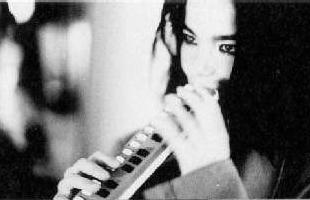
"In
a weird way it's pleasantly familiar, because it's very
similar to what I am in Iceland, what I am now in England. People
talk to you in the shops, and old people sort of pat you on the head,
and kissing you, and everybody are sort of sweet, and they get that
grin on their face when they see me."
She's dealt well with this fame nonsense. Partly because she's
had a smalltown dress rehearsal for it, but largely because she has
no time for the celebrity rules.
"I used to be in a punk band that
was so hardcore that if someone came to us and asked for an autograph,
we'd just tell them to fuck off and get a life."
I suggest sending that message out to her fan club.
"Get a life!" She laughs.
"Then again, there are strange things which
make people happy," she says, reconsidering.
"Like I get really happy and sentimental if my kid
writes something to me, or I like the colour fluffy white. We all
got our little soft spots; why can't you brush your teeth with your
socks on, things like that."
Up high on Björk's balcony is a ruffled white duvet overseen by
the computer clutter of a miniature home studio. This looks down on
the blond floor of the airy living room, which in turn rests over
her son's room, the kitchen and a bathroom. Her house is totally
organised. "We've got sleeping and working up
here," she explains. "Then
down there there's movies - entertainment, then the bottom
floor is eating and shitting."
"You haven't seen my TV yet," she perks. We grab shot glasses
and a bottle of grappa to view her new toy. A darkened wall flickers
into life and a six foot projection joins the soundtrack. It's Bruce
Weber's film, Let's Get Lost. Jazz legend Chet Baker's wrinkled hide
fills the screen, high on methadone and framed by a couple of worn-out
lounge ladies. Each time the gnarled trumpeter stirs himself to
speech, Björk bursts with girly excitement.
"He's just there," she
pips. "He's so completely in the present. E
ven old and fucked up." She loves his now-ness.
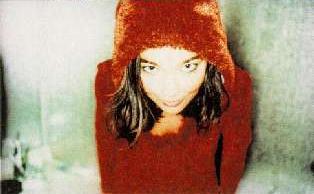
The film whisks Chet back to the days when his sad-eyed prettiness
matched his nightingale voice. Björk practically faints. If he were
still alive she'd be seeking him out. He'd make the perfect accomplice
for her fierce, screaming, smiling, mission.
She sits up, takes a sip of her drink, and thinks something out:
"I realise
that my little job is about generosity," she confides.
She'd like her songs to affect people the way Chet's songs affect
her: "It's
amazing that you can sit in a car and be really depressed
and horrible in a taxi or something, and then just the right song
comes on the radio. And it just fucking sorts you out. I just find
that... that's a miracle."
I tell her I admire her freedom. She's flattered.
"Freedom is the
biggest aphrodisiac,"
she declares, Viking to the end. "The good
things in life is having a bottle of red wine and a friend of yours
all sleeping in the grass or jumping in the ocean."
The album, All The Remixes Of The Debut Album
For People Who Don't Buy White Labels, is out
on Sept 10 on One Little Indian. The video,
Vessel, is out on Sept 5 on Polygram.
|